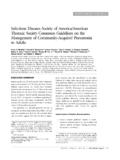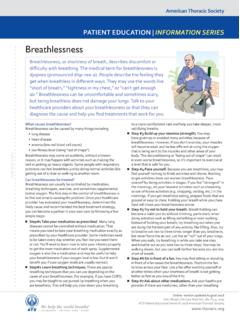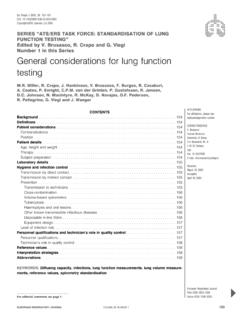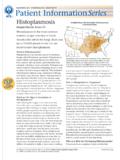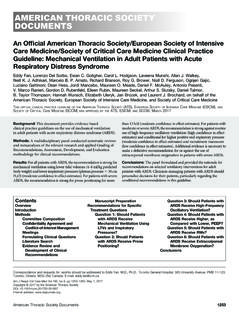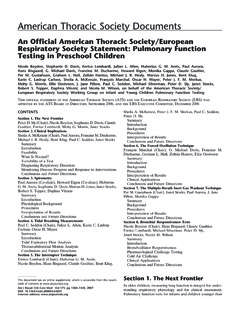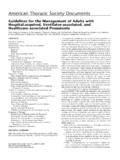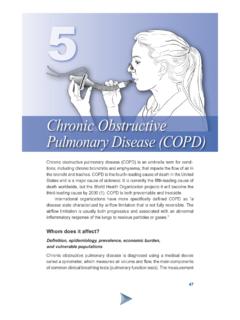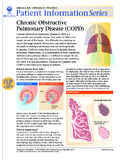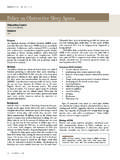Transcription of Sleep Mini Series #4 NORMAL AIRWAY Obstructive …
1 Likely to be overweight. Common symptoms of Obstructive Sleep apnea include snoring, stopping breathing during Sleep , frequent awakenings during the night and difficulty staying asleep throughout the night. It is also common for patients who have Obstructive Sleep apnea to be tired and sleepy during the day. This sleepiness can cause accidents at work, poor work performance and car crashes. Obstructive Sleep apnea can also have a bad effect on your heart and your blood vessels (arteries, veins and capillaries), which is also referred to as the cardiovascular system. What kinds of cardiovascular problems can I get with Obstructive Sleep apnea?
2 Several cardiovascular conditions can happen with untreated Obstructive Sleep apnea. For example, if you have Obstructive Sleep apnea, you are more likely to have high blood pressure (hypertension) or it may be difficult to control your blood pressure. Of people with hypertension, about 30% have Obstructive Sleep apnea. If you have Obstructive Sleep apnea, there is a 50% chance you also have hypertension. Problems with the rhythm of your heart may occur such as atrial fibrillation (irregular heart beat) and bradycardia (slow heart rate). Patients with severe Obstructive Sleep apnea are four times more likely to have atrial fibrillation compared to those without Obstructive Sleep apnea (OSA) is a condition in which you stop breathing during Sleep because of a narrowed or closed breathing passage ( AIRWAY ).
3 Adults with Obstructive Sleep apnea are more the disorder. Not receiving treatment for your Sleep apnea may make your atrial fibrillation difficult to control. For example, in patients who have atrial fibrillation cured with catheter ablation (a special treatment to the heart), those with untreated Obstructive Sleep apnea are 25% more likely to have their atrial fibrillation return. Patients with Obstructive Sleep apnea are also more likely to have coronary artery disease. Coronary artery disease (also known as the hardening of the arteries) happens when the small blood vessels that supply blood and oxygen to your heart become narrow.
4 Narrowed coronary arteries can lead to heart attacks. If you have severe Obstructive Sleep apnea that is untreated, you are twice as likely to develop heart attacks in the future as those without the problem. In addition, up to 70% of patients admitted to the hospital because of coronary artery disease were found to have Sleep apnea. If you have heart failure, Obstructive Sleep apnea can make it worse. Also, people with untreated Obstructive Sleep apnea can develop heart failure. The chance of having Obstructive Sleep apnea if you have heart failure is quite high. How does Obstructive Sleep apnea cause heart disease?
5 The reason why patients with Obstructive Sleep apnea develop heart disease is not exactly known. Obstructive Sleep apnea Am J Respir Crit Care Med Vol 188, P1-P2, 2013. Patient Education Series 2013 American Thoracic SocietySleep Mini Series #4 Obstructive Sleep Apnea and Heart DiseaseNORMAL AIRWAYOBSTRUCTED AIRWAYNORMAL AIRWAYOBSTRUCTED AIRWAY causes you to have frequent pauses in your breathing; these pauses mean that you actually stop breathing and this causes you to wake up at night. When these breathing pauses happen, the oxygen level in your blood gets low. It is thought that the frequent bouts of low oxygen levels during Sleep damages the blood vessels that supply the heart.
6 Also with each one of the episodes, your body tells your heart to beat faster and your blood pressure to go up. Severe Obstructive Sleep apnea can also cause stress on your heart causing the heart to get enlarged. An enlarged heart can cause the heart to get less oxygen and work less efficiently. Will treating my Obstructive Sleep apnea treat my heart disease?The most common way of treating Obstructive Sleep apnea is with a mechanical device known as continuous positive AIRWAY pressure (CPAP). [See the ATS Patient Series on Obstructive Sleep Apnea in Adults and Obstructive Sleep Apnea in Children at ].
7 The CPAP machine blows air through a hose into a mask worn snugly over your nose or mouth. This air goes into your lungs and keeps the AIRWAY from closing during Sleep . This corrects your Sleep apnea, prevents your blood oxygen levels from falling during Sleep and allows you to get a restful Sleep . Using CPAP regularly at night as prescribed by your health care provider also helps the stress on your heart. If you have atrial fibrillation, CPAP use may control your irregular heartbeats. If you have both severe Sleep apnea and hypertension, CPAP will likely help control your blood pressure. Patients can become comfortable with the CPAP device with time.
8 Those who wear CPAP at night often say that they are getting the best Sleep that they have gotten The ATS Patient Information Series is a public service of the American Thoracic Society and its journal, the AJRCCM. The information appearing in this Series is for educational purposes only and should not be used as a substitute for the medical advice one one s personal health care provider. For further information about this Series , contact at a long time. Some people though may have trouble getting accustomed to sleeping with the CPAP device. If you are having difficulty, speak with the Sleep specialists at the clinic to get the right nasal or full-face mask and the right setting for you.
9 There are very good reasons to try and use the CPAP every night. CPAP therapy can help you control the symptoms of your Sleep apnea and prevent or control the heart-related problems associated with Sleep apnea, which are often severe and life limiting. Authors: Jeremy Weingarten, MD and Susmita Chowdhuri, MD Reviewers: Suzanne C. Lareau RN, MS and Margaret-Ann Carno PhD, RN, CPNPR eferences:American Heart Association Healthy Sleep : Foundation at Sleep -apnea-and-heart-disease Action Steps If you have a cardiovascular disease such as heart failure, irregular heartbeats and/or hypertension and have trouble breathing at night(or your bed partner tells you that you snore, gasp or stop breathing at night)
10 , speak with your health care provider about referring you for a Sleep study If you have been given a CPAP machine for Sleep apnea, use it every night If you are having difficulty sleeping because of the CPAP machine, speak to the Sleep specialists at the clinic for help, don t just stop using the machine Doctor s Office Telephone.
